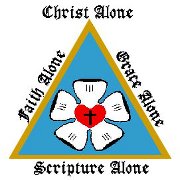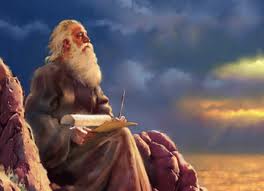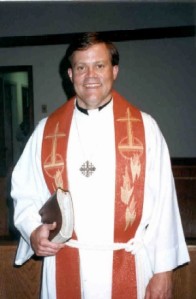Mark Dankof for the Lutheran Ministerium and Synod–USA: The Chosen People of God: Who Are They?
[This transcript represents a greatly abbreviated version of the sermon delivered by Mark Dankof in Chetek, Wisconsin on June 23rd, 2013 at the closing worship service in Christ Lutheran Church for the National Convention of the Lutheran Ministerium and Synod–USA.]

The Logo of the LMS-USA and the Pillars of Luther’s Reformation: Christ Alone, Faith Alone, Grace Alone, Scripture Alone.
“But you are a Chosen People, a Royal Priesthood, a Holy Nation, a people belonging to God, that you may declare the praises of Him who called you out of darkness into His wonderful light. Once you were not a people, but now you are the people of God: once you had not received mercy, but now you have received mercy.”
I Peter 2: 9-10
It is good to see all of you again at this treasured annual gathering of a small segment of the remnant of the Chosen People of God in the closing days of the Church Age and the end of history itself as we approach the Second Advent of our Lord and Savior Jesus Christ.
As I open our very brief time together at our Convention’s closing worship service on this blessed Fifth Sunday After Pentecost, I’m blissfully reminded of three (3) things. First, each time I come back here, my earliest memories of the American Midwest and those that would follow over many years keep flooding back. The Middle West is where my roots are, having been born to parents from Southwest Iowa, who grew up in the years of the Great Depression in the run up to World War II. At the same time, being the son of a United States Air Force officer, there were no roots for me at all. I would travel all over our country, as well as Europe, Southeast and Central Asia, the Middle East, the former Soviet Union, and South Africa. Of all of these sojourns that God would grant me for reasons known only to Him, many of you know that Iran would be the place where many of my fondest memories of traveling the globe would reside. When I returned from South Africa last December, I wrote a brief essay on this insight. It is entitled, “A Reminder of God’s Existence From Long Ago.”
Secondly, when I come to these Conventions, my mind inevitably drifts back to the salad days of the formation of the American Association of Lutheran Churches (AALC) in 1987. This is where I would first encounter Pastors Ralph Spears and John Erickson, who have remained among my best friends in life. Can it really be over a quarter of a century ago that our journey began?
Finally, it is June 23rd today. Every June 23rd, my mind goes back to June 23rd, 1967 when my family was transferred from Hawaii the first time, and transported back to the Mainland on the S. S. Lurline bound for San Francisco. Last year, I shared this experience of 46 years ago at our National Convention with many of you. Incredibly enough, that was exactly one year ago today, on June 23rd, 2012, when my message to the gathered was entitled, “The Famine, The Watchman, and The Remnant.” Given that fact that we are now a year closer to the return of our Lord Jesus Christ, I hope that presentation continues to encourage both you and me as the horizon of history continues to darken as storm clouds approach our position near Midnight.
Today’s message based on the classic text of I Peter 2: 9-10, familiar to so many of us who toiled as kids in the Lutheran Catechetical system a lifetime ago, has three applications to us today and to the entirety of the people of God throughout linear time. The text reads as follows:
“But you are a Chosen People, a royal priesthood, a holy nation, a people belonging to God, that you may declare the praises of Him who called you out of darkness into His wonderful light. Once you were not a people, but now you are the people of God: once you had not received mercy, but now you have received mercy.”
I Peter 2: 9-10
The first application Biblically is this: God chooses great people in history to minister to His saints in times of global oppression and evil. I was reminded of this only eight (8) days ago in Houston, Texas when privileged to see the Cyrus Cylinder at the Museum of Fine Art there, courtesy of a loan of the Cylinder to a series of America’s greatest museums courtesy of the British Museum.
What is the significance of Cyrus the Great, the first of the Achaemenid Kings of Ancient Persia, where the Old Testament is concerned? The Bible is absolutely explicit on this point. After the 70 year Captivity visited upon Ancient Judah courtesy of King Nebuchadnezzar of Babylon, a Captivity which included the Temple Destruction of 586 B. C. [Tisha B’Av], God’s prophets underscore that this catastrophe brought upon Judah because of its own sin and rebellion against God (Jeremiah 25:1- 29:32) would be followed by a Deliverance and a Restoration. King Cyrus the Great would be the Chosen Instrument of God in this process, a prototype and forerunner of Jesus Christ, the Lion of the Tribe of Judah (2 Chronicles 22-23; Ezra, chapters 1, 3, 4, 5, 6; Isaiah, chapters 44 and 45; and Daniel, chapters 1, 6, 10).
Particularly striking are the words of Isaiah, who foretold the coming Persian King’s arrival in history 150 years in advance of his appearance, courtesy of the inspiration of the Holy Spirit of God:
“. . . [The Lord] who says of Cyrus, ‘He is my Shepherd and will accomplish all that I please; he will say of Jerusalem, ‘Let it be rebuilt,’ and of the temple, ‘Let its foundations be laid. . . . I will raise up Cyrus in my righteousness: I will make all his ways straight. He will rebuild my city and set my exiles free, but not for a price or reward, says the Lord Almighty.”
And Ezra tells us in chapter one that:
“In the first year of Cyrus king of Persia, in order to fulfill the word of the Lord spoken by Jeremiah, the Lord moved the heart of Cyrus king of Persia to make a proclamation throughout his realm and to put it in writing. This is what Cyrus king of Persia says, ‘The Lord, the God of heaven, has given me all the kingdoms of the earth and He has appointed me to build a temple for Him at Jerusalem in Judah. Anyone of His people among you–may his God be with Him, and let Him go up to Jerusalem in Judah and build the temple of the Lord, the God of Israel, the God who is in Jerusalem. . . .'”
Now fast forward to I Peter 2: 9-10. What is the connection of the Apostle and his text to the events of the Sixth Century B. C. and an ancient Persian King?
I will say it again: The first application Biblically is this: God chooses great people in history to minister to His saints in times of global oppression and evil.
Peter is writing his Epistle to a group of churches in the part of Asia Minor north of the Taurus Mountains. The context is the approaching outburst of persecution directed at Christians by Nero (A. D. 54-68) in A. D. 64. The martyrdom of the Apostle Paul is just beyond the horizon. Peter’s horrific upside down crucifixion at Nero’s direction before the latter’s death in A. D. 68 is but a handful of years away (John 21: 18-19). The storm clouds that approached Ancient Judah after the death of King Josiah in 609 B. C. and culminated in Nebuchadnezzar’s temple destruction in 586 B. C., are gathering again for the people of God living under the Roman Caesar’s reign in the First Century A. D. But God does not desert His faithful. As Cyrus the Great made his Sixth Century B. C. appearance at a time of the Lord’s providential designation, so Paul and Peter have been commissioned to minister to the faithful in the midst of the exponential increase in evil in human history embodied by the Ancient Roman Empire. And the message and witness of these Apostles is clear: the Lord Jesus Christ, God’s Son, is the center of the plan of salvation designed before the foundation of the world for those who believe (I Peter 1: 3-5). And those who believe in the midst of a national culture centered in the things of the Beast (Revelation 13), will endure persecution and oppression at the hands of a majority who have rejected the Messiah, both in a First Century Judah nearing God’s judgment for its role in the rejection of the proclamation of the Kingdom of God (Matthew 24: 1-2), and in a Roman Empire moving toward the Emperor Worship Cultus of Domitian (81-96 A. D.) at the time of the writing of the Apocalypse of John (Revelation 13).

John on Patmos: Exiled Because of Resistance to the Emperor Worship Cultus of Domitian
(A. D. 81-96).
The same principle applies to Christians in a 21st century America and Western World which have largely abandoned the faith “that was once for all entrusted to the Saints (Jude, verse 3).” Peter warns us as he warned his contemporaries in Asia Minor that we are to be fully ready for this. In I Peter 4:12 he emphatically tells believers “. . . do not be surprised at the painful trial you are suffering, as though something strange were happening to you. But rejoice that you participate in the sufferings of Christ, so that you may be overjoyed when His glory is revealed.”
It is painful for many of us as lifelong denizens of an older American culture, especially in the Middle West and the Southern United States, to recognize how this nation has become a part of the same post-Christian culture of our European counterparts across the Atlantic Ocean. And how closely we are beginning to resemble the ethos of the Ancient Roman Empire. As the late Evangelical Francis Schaeffer observed in the aftermath of the 1973 Roe v. Wade Supreme Court decision, we are increasingly a Culture of Death. Abortion-On-Demand; every form and brand of sexual perversion; rampant violence and crime; the collapse of the family; the embrace of a Hollywood culture enshrouded in moral sewage; a staggering level of budgetary and national debt; a thoroughly corrupt political and banking system centered in fiat money, usury, and confiscatory taxation; and the overextension of our military presence globally, are the symptoms. but the root cause is fundamentally a rejection of the Gospel and of God’s Word on an individual and collective basis. Those who refuse to take the Mark of the Beast (Revelation 13), either in the Rome of Nero and Domitian, or in the increasingly anti-Christian West of the 21st Century, may fully expect trial, tribulation, persecution, imprisonment, and ultimately martyrdom. As Peter has already told us, “. . . do not be surprised at the painful trial you are suffering, as though something strange were happening to you. But rejoice that you participate in the sufferings of Christ, so that you may be overjoyed when His glory is revealed.” This is the bottom line.
The second application of I Peter 2: 9-10 Biblically is this: God chooses to deliver on His promises, both those made to members of His Son’s Kingdom and those made to individuals and societies outside of the Kingdom of God in Christ.
Any reasonable interpretation of this text and of the New Testament throughout, tells us that the Chosen People of God according to the teachings of our Lord and His apostles, include all who believe in Jesus as Crucified and Risen Savior. Paul assures us in Romans 10:9 that if “you confess with your lips that Jesus is Lord and believe in your heart that God raised Him from the dead, you shall be saved.” This too, is the bottom line.
The New Testament and I Peter 2: 9-10 as a part of that corpus, explicit reject the notion that the Chosen People of God and the Kingdom of God itself, are rooted in notions of racial supremacy, racial identification, nationalism, military power, political power, or economic supremacy. Jesus makes this clear in his debate with the Pharisees in John 8: 31-58. Modern Christian Zionism, based in these false assumptions and in the 19th century eschatological inventions of John Nelson Darby and the Scofield Reference Bible [see charts in “The Famine, The Watchman, and The Remnant” regarding an alleged parenthesis between the 69th and 70th weeks of Daniel, chapter 9], has resurrected the very false teachings surrounding the Kingdom, the Covenants, Obedience, and Racial Identification that permeated the thinking of the Pharisees in John 8 and those who called for the release of Barabbas on the night of the Savior’s betrayal (Matthew 27:25). This was the thinking of Paul prior to his conversion on the road to Damascus (Acts 9). It is an explicit denial of the core doctrine of Justification by Faith in Jesus Christ Alone known as the Material Principle of the Protestant Reformation of the 16th Century.
This is why Peter uses 2: 9-10 to reiterate what Paul says in Ephesians 1:4 when he states that “. . . He [God the Father] chose us in Him [God the Son, Jesus Christ] before the foundation of the world . . .” Peter now tells believers in Christ who are racial Gentiles who were “once not a people” that they are “now the people of God” (I Peter 2: 10). He assures his audience that, “Once you [Gentiles] had not received mercy, but now you have received mercy.”
Peter now applies the terms and the concepts of Old Testament Judaism to Gentiles who believe in Jesus Christ (verse 9). They are now a “Chosen People.” They are now members of a Royal Priesthood [of all believers in Jesus Christ], and are a “Holy Nation” and a “People Belonging to God.” The Apostle’s application of these terms and concepts to Gentile Christians is fraught with impending spiritual and political irony. After Peter’s death by crucifixion in A. D. 68 in Rome, it would only be two years before the Romans would visit Jerusalem in a fashion reminiscent of Nebuchadnezzar in the Sixth Century B. C., and would destroy yet another Jewish Temple on Tisha B’Av (August 9th) in the year A. D. 70. The notion of National and Racial Judah as the Chosen People of God in the New Testament Era had come to a catastrophic end, never to be resurrected again (Matthew 21: 19 and Mark 11: 14).
As for the true Chosen People of God, it is critical that those “chosen” are also a People “called.” We are called “out of darkness.” We are called “into His wonderful light.” God’s call is to his “elect” (I Peter 1:1). The elect have been “chosen according to the foreknowledge of God,” (I Peter 1:2) which involves both divine mystery and grace linked to the blood of Jesus Christ (I Peter 1:2).
The third and final application of Biblical principles using I Peter 2: 9-10 is as follows: You and I, as the Chosen People of God by his mysterious love and grace alone, have an inheritance (I Peter 1: 4) that is imperishable.
If we are living in the hour of history I sense we are, what are the implications of this for you and me? As we close this National Convention, what do you take from these last 3 days and from this sanctuary and the classrooms here at Christ Lutheran in Chetek? What do you return home with that will encourage you and empower you and your loved ones in trying times? Why do we continue in a faith that seems less appealing than ever in our dying culture, and in an America increasingly unrecognized by those of us of an earlier vintage?
In a nutshell, the answer is in a gift of God to you and me that involves mercy, rebirth, new beginnings, a new life, and an imperishable inheritance being kept in a Divine Repository for safe keeping until the right time. This is the final bottom line of which we speak on the Fifth Sunday After Pentecost in the year 2013. The Chosen People of God shall be the final winners at the end of history, and in the eternity to come, in a world without end.
I Peter 1: 3-5 serves as a marvelous companion to I Peter 2: 9-10 and our Chosen People theme for the 2013 National Convention of the Lutheran Ministerium and Synod–USA:
“Praise be to the God and Father of our Lord Jesus Christ! In His great mercy He has given us new birth into a living hope through the resurrection of Jesus Christ from the dead, and into an inheritance that can never perish, spoil, or fade–kept in heaven for you, who through faith are shielded by God’s power until the coming of the salvation that is ready to be revealed in the last time.”
As that last time draws ever closer, so does your salvation and the arrival of your long awaited and promised inheritance. For every ending there is a New Beginning. The best is yet to come for you, and for me, as we await the re-entry of the Logos into the time and space of this present cosmos. And now may the grace of our Lord Jesus Christ, the love of God the Father, and the fellowship of God the Holy Spirit be with you now, and always. Amen.

